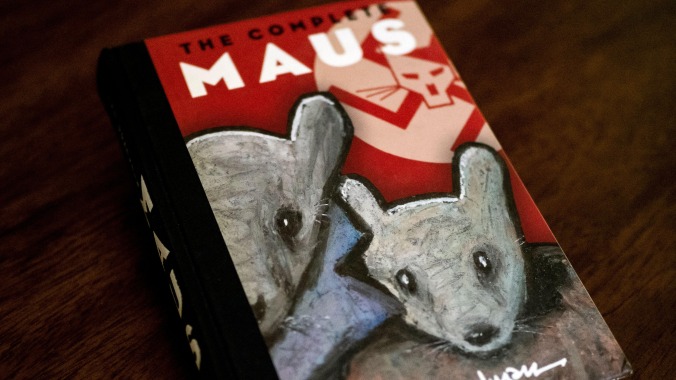Sales of Maus spike after Tennessee book banning
Art Spiegelman's graphic novel about his father's experience in the Holocaust is topping Amazon's charts after being kicked out of a Tennessee school district

Sales of Art Spiegelman’s Maus—the writer and illustrator’s Pulitzer Prize-winning graphic novel account of his father’s experiences as a Holocaust survivor—have reportedly spiked online this week. Said boost might partly be attributed to International Holocaust Remembrance Day having arrived this past Thursday—but probably has a lot more to do with a vote by a recent Tennessee school board, which took the, let’s say, unconventional tack of celebrating the day of remembrance by banning Maus from its schools.
Specifically, the McMinn County school board voted earlier this month, 0 to 10, to pull Maus due to “inappropriate language” and a depiction of a nude woman. Response to the move—and the implied belief that kids shouldn’t be exposed to bleakly educational accounts of real-world genocide if it also means being exposed to naughty words—has been met with a wide amount of derision online.
And purchases, apparently; per AP News, sales of all the editions of Maus (the individual Volumes 1 and Volume 2, and the collected The Complete Maus) are currently near the top of Amazon’s Best Sellers in Books ranking. AP News notes that Maus wasn’t even in the Top 1000 of Best Sellers this week before news of the ban broke wide.
But Spiegelman himself is clearly more worried about what the banning of the book could potentially mean: He appeared on CNN this weekend to discuss the “daffily myopic response” from people who, he facetiously noted, “may possibly not be Nazis…maybe.”
“The problem is sort of bigger, and stupider, than that,” Spiegelman continues, pointing out the Board’s hyper-focus on “some bad words that are in the book.” “It has the breath of autocracy and fascism about it…,” he added. “I think of it as a harbinger of things to come.”
It’s worth noting that the Maus ban is just the most high-profile case in a continued effort by Helen Lovejoy types to patrol school libraries for supposedly offensive content, targeting, as it does, a widely heralded, established work that even non-comics-fans have heard of and probably read.
Maia Kobabe’s autobiographical graphic novel Gender Queer: A Memoir, for instance, has been a much more frequent target in these little crusades over the last year, with its frank and honest depiction of teenage sexual realities drawing a “pornographic” description from South Carolina governor Henry McMaster, and bans from libraries around the country. Which is mostly just to note that targeting Maus is simply the most absurd, emboldened bubble of an ongoing front in the current culture wars being waged in, and on, American schooling over the past few years.